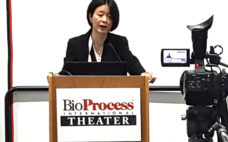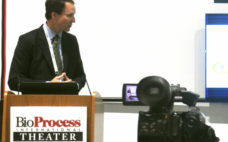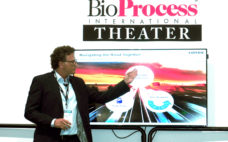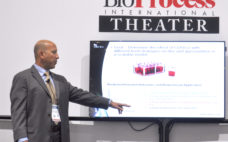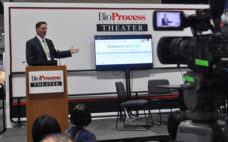Tony Fultz (director of upstream manufacturing at Fujifilm Diosynth Biotechnologies) presented an “Ask the Expert” webinar on 23 August 2017. Fultz’s Presentation Human error was responsible for about 75% of batch failures at contract manufacturing organization Fujifilm Diosynth Biotechnologies in 2016. Technicians operate in a dynamic and stressful environment, both contributing factors to human error. With multiple projects running concurrently, some employees are involved in executing several processes during a shift. The company has several ways of reducing human error:…
Author Archives: BPI Staff
Ask the Expert: CHT Column Packing Is Easier Than You Think
On 6 September 2017, Mark Snyder (manager of the process chromatography R&D applications group at Bio-Rad Laboratories) gave an “Ask the Expert” presentation on process-scale column packing with CHT ceramic hydroxyapatite media. Snyder’s Presentation CHT is an incompressible mixed-mode chromatography medium using cation exchange and calcium-affinity interactions, and it is available in 40-ÎĽm and 80-ÎĽm particle sizes. This medium can be used to purify monoclonal, polyclonal, and bispecific antibodies; antibody fragments; other recombinant proteins and isozymes; viruses, viral particles, and…
September Spotlight
“Smaller Is Better” Chemical Bioproduction Ramon Gonzalez, professor of chemical and biomolecular engineering at Rice University and director of its Advanced Biomanufacturing Initiative (iBIO), believes that “waste” methane represents an opportunity for biomanufacturing that should not be missed. Instead of getting burned off, methane could and should generate profits. With advancements in biomanufacturing, wild-type or genetically modified bacteria can turn carbon-rich methane into valuable chemicals — producing them at smaller scales in more environmentally friendly processes than those of classical…
New Tools to Improve Cell Viability, Purity, and Recovery
Presented by Sean Kevlahan (chief executive officer, Quad Technologies) 11:00–11:20 am Kevlahan described Quad Technologies as an early stage company founded in 2013 and headquartered in Woburn, MA. Its approach to cell and gene therapies is offering bioprocessing tools with a biomaterials focus. The company’s QuikGel platform is a hydrogel-based technology for making different sizes of hydrogel microbeads that will dissolve under gentle conditions. The beads can be magnetic or nonmagnetic for both research and bioprocessing applications. This technology provides Quad…
Advanced Therapies Capabilities at FDBT
Presented by Yan Zhi (program design technical lead, Fujifilm Diosynth Biotechnologies) 11:20–11:40 am Fujifilm Diosynth Biotechnologies Texas (FDBT) has two dedicated viral products facilities: The National Center for Therapeutic Manufacturing (NCTM) building was designed for process development and early phase clinical good manufacturing practice (GMP) production of advanced therapeutics including viral, microbial, and plasmid products. The newly built Flexible Biomanufacturing Facility (FBF) is designed for clinical and commercial GMP production of viral products. The NCTM boasts 14 first- and second-generation mobile…
Covering a Spectrum of New Product Development Technologies: From Cells to Cell Therapy
Presented by Stewart McNaull (senior vice president of business development, KBI Biopharma) 11:40 am–12:00 pm Founded in 2004, KBI Biopharma operates a core facility in Durham, NC. In 2013, the company needed more space and set up laboratories in Research Triangle Park, NC. Using mammalian cell lines, it has developed both monoclonal antibody (MAb) and non-MAb platforms. It acquired a former Merck site in Boulder, CO, in 2014 and retained staff experts in fermentation expression, refolding, and mass spectrometry. With manufacturing…
Navigating the Road to Commercialization Together
Presented by Cyril Peter (senior proposal manager, Lonza Pharma and Biotech) 1:00–1:20 pm A publicly traded company, Lonza focuses on drug sponsors that want to go to market with their own products. “To get there, you need to make a drug out of your molecule, manufacture it, go through clinical trials, and generate data for submission to regulatory authorities for market authorization.” That requires information about the molecule (critical quality attributes, CQAs) and on how you make it (critical process parameters,…
Increasing Cell Productivity and Quality in MAb Production By Focusing on a Novel Target
Presented by Adam Elhofy (chief science officer, Bio-Ess Laboratories) 2:00–2:20 pm “What we call biomanufacturing,” said Elhofy, “is all about cells. When cells get cranked up, they start to have deficiencies — and those deficiencies lead to different protein quality, to aggregates, and to a loss of consistency in protein quality. So how do you improve productivity and protein quality?” Bio-Ess Laboratories (formerly Essential Pharmaceuticals) has a technology to address the role that lipids play in cell productivity. The company has…
Advancing the MAb Therapies of Tomorrow
Thomas Page (vice president, engineering and asset development, Fujifilm Diosynth Biotechnologies USA) 1:00–1:20 pm Page introduced Fujifilm Diosynth’s Saturn monoclonal antibody (MAb) platform, which is based on the Apollo cell line. A senior team working from three facilities designed this new platform by challenging everything from previous designs, keeping the best aspects, and throwing out what did not work well — while innovating where necessary. All functional units were represented and empowered to make decisions. The team used risk-based tools…
May Spotlight
Welcome New Editorial Advisor David Rabuka is global head of research and development in chemical biology at Catalent Biologics, with overall responsibility of overseeing continued research and development of SMARTag technology. He also oversees strategy, resource allocation, and scientific oversight of preclinical and clinical studies. David joined Catalent Biologics following Catalent’s acquisition of Redwood Bioscience Inc., where he was founder, president, and chief scientific officer. David’s scientific areas of expertise include chemical synthesis; drug delivery; translational research; chemistry, manufacturing, and…




